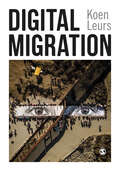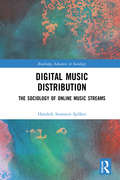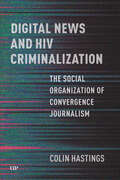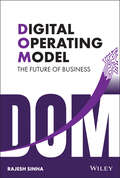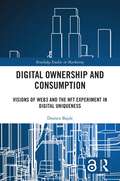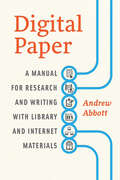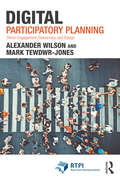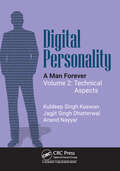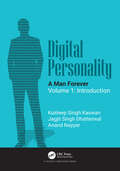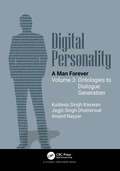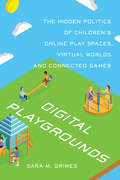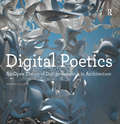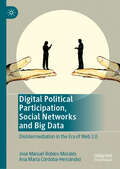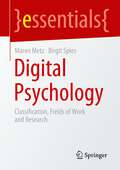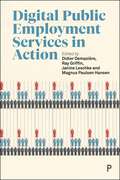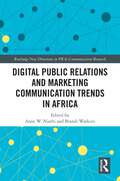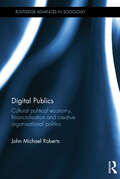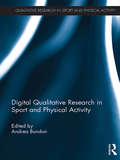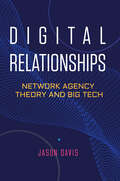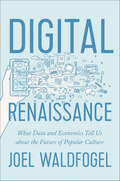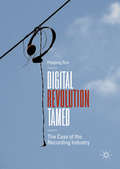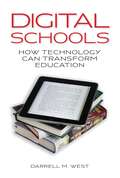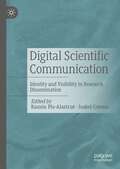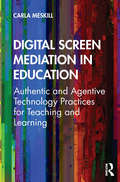- Table View
- List View
Digital Migration
by Koen Leurs"A revelation for digital researchers and a provocation for migration scholars… It introduces an insightful, inspiring, and inviting way of making sense of the messiness without losing hope of changing things." - Nishant Shah, Chinese University of Hong Kong "A must read for everyone who is concerned with questions of human mobility, media and communications and the digital border." - Myria Georgiou, LSE "A much-needed addition to scholarship on mobility, technology, and migration… The book is poised to become a touchstone text." - C.L. Quinan University of Melbourne In contemporary discussions on migration, digital technology is often seen as a ′smart′ disruptive tool. Bringing efficiencies to management, and safety to migrants. But the reality is always more complex. This book is a comprehensive and impassioned account of the relationship between digital technology and migration. From ′top-down′ governmental and corporate shaping of the migrant condition, to the ′bottom-up′ of digital practices helping migrants connect, engage and resist. Taking an interdisciplinary approach, Digital Migration explores: The power relations of digital infrastructures across migrant recruitment, transportation and communication. Migrant connections and the use of digital devices, platforms and networks. Dominant digital representations of migrants, and how they’re resisted. The affect and emotion of digital migration, from digital intimacy to transnational family life. How histories of pre and early-digital migration help us situate and rethink contemporary research. The realities of researching digital migration, including interviews with leading international researchers. Critical yet hopeful, Koen Leurs opens up the unequal power relations at the heart of digital migration studies, challenging us to imagine more just alternatives. Koen Leurs is an Associate Professor in Gender, Media and Migration Studies at the Graduate Gender Program, Department of Media and Culture, Utrecht University, the Netherlands. All author royalties for this book will be donated to the Alarm Phone, a hotline for boatpeople in distress.
Digital Music Distribution: The Sociology of Online Music Streams (Routledge Advances in Sociology)
by Hendrik Storstein SpilkerThe digital music revolution and the rise of piracy cultures has transformed the music world as we knew it. Digital Music Distribution aims to go beyond the polarized and reductive perception of ‘piracy wars’ to offer a broader and richer understanding of the paradoxes inherent in new forms of distribution. Covering both production and consumption perspectives, Spilker analyses the changes and regulatory issues through original case studies, looking at how digital music distribution has both changed and been changed by the cultural practices and politicking of ordinary youth, their parents, music counter cultures, artists and bands, record companies, technology developers, mass media and regulatory authorities. Exploring the fundamental change in distribution, Spilker investigates paradoxes such as: The criminalization of file-sharing leading not to conflicts, but to increased collaboration between youths and their parents; Why the circulation of cultural content, extremely damaging for its producers, has instead been advantageous for the manufacturers of recording equipment; Why more artists are recording in professional sound studios, despite the proliferation of good quality equipment for home recording; Why mass media, hit by many of the same challenges as the music industry, has been so critical of the way it has tackled these challenges. A rare and timely volume looking at the changes induced by the digitalization of music distribution, Digital Music Distribution will appeal to undergraduate students and policy makers interested in fields such as Media Studies, Digital Media, Music Business, Sociology and Cultural Studies.
Digital News and HIV Criminalization: The Social Organization of Convergence Journalism (Institutional Ethnography)
by Colin HastingsFor years, HIV activists and researchers have expressed deep concerns about the stigmatizing and sensational tone of news stories about HIV criminalization. Digital News and HIV Criminalization investigates the everyday work of journalists and uncovers how newswork routines are hooked into other institutions, including the criminal legal system, police, and public health, that regulate the daily lives of people living with HIV. This lively institutional ethnography offers key insights into how the digital news media ecosystem is socially organized. It reveals that the fast-paced conditions of digital news media in the age of convergence journalism require the constant, rapid production of sensational news stories that will be consumed widely by online audiences, often resulting in news writing that perpetuates social harms connected to stigmatizing, racist, and anti-immigrant views. The book illustrates how biased reporting on HIV criminalization reflects broader trends in online news and presents opportunities for HIV activists to form coalitions with other groups negatively affected by the current landscape of convergence journalism. Tracing how work that produces and circulates a standard genre of news story about HIV criminalization is coordinated across time and space, Digital News and HIV Criminalization offers a groundwork for political action aimed at disrupting the production of stigmatizing news stories.
Digital Operating Model: The Future of Business
by Rajesh SinhaBuild your company&’s next-generation growth strategy by using emerging technologies to disrupt your field and energize your business In Digital Operating Model: The Future of Business, digital strategist and execution expert Rajesh Sinha delivers a robust and practical operating blueprint for digital transformation. Applicable to any industry, any size company, this playbook helps executives, professionals, managers, founders, owners, and other business leaders understand the importance and realize the benefits of a digital future for their companies—all without having to spend massive amounts of money in the process. The author explores effective methods to create multiple digital accelerators, develop cultural alignment that fosters innovation and delivers rapid solutions, and shares insights into the new mantras of our goods-and-services on-demand economy. Readers will also find: Step-by-step guidance to implementing a digital platform strategy that leads to exponential business growth Methods for designing and applying new businesses processes that create better experiences internally for your teams and externally for your customers and customers&’ customers, which also leads to exponential business growth Real-life examples and case studies of businesses that have achieved successful digital acceleration and grown dramatically in the processDigital Operating Model shows readers how to meet their professional objectives while realizing profound transformation that offers innovative and durable differentiation both in terms of purpose and profits.
Digital Ownership and Consumption: Visions of Web3 and the NFT Experiment in Digital Uniqueness (Routledge Studies in Marketing)
by Domen BajdeThis book ventures into new and often-contested terrains of NFT consumption to explore what they reveal about digital ownership. Is there a place for ownership in the digital world? What does it mean to possess something digital? What is the role of uniqueness in digital ownership? How do digital things come to be unique? The author undertakes this journey by drawing on consumption research, sociological, philosophical and law literature, and by paying close attention to what NFT consumers and industry insiders have to say about digital ownership.This book comprises three parts exploring three overarching ideas: (1) that the NFT experiment helps shake up entrenched assumptions about ownership, thus opening new avenues for thinking and exploring digital ownership and its role in society; (2) that ownership is not just a bundle of legal rights or a social-technical arrangement, but also a powerful force in, and outcome of, how we imagine society and the future; (3) that the NFT experiment invites us to more closely examine the relation between digital ownership and uniqueness and offers valuable insights into contemporary society of singularities.While the primary intended audience for this book are consumption scholars and students, many other readers interested in digital ownership, digital markets and Web3 will find it interesting and relevant.
Digital Paper: A Manual for Research and Writing with Library and Internet Materials (Chicago Guides to Writing, Editing, and Publishing)
by Andrew AbbottToday’s researchers have access to more information than ever before. Yet the new material is both overwhelming in quantity and variable in quality. How can scholars survive these twin problems and produce groundbreaking research using the physical and electronic resources available in the modern university research library? In Digital Paper, Andrew Abbott provides some much-needed answers to that question. Abbott tells what every senior researcher knows: that research is not a mechanical, linear process, but a thoughtful and adventurous journey through a nonlinear world. He breaks library research down into seven basic and simultaneous tasks: design, search, scanning/browsing, reading, analyzing, filing, and writing. He moves the reader through the phases of research, from confusion to organization, from vague idea to polished result. He teaches how to evaluate data and prior research; how to follow a trail to elusive treasures; how to organize a project; when to start over; when to ask for help. He shows how an understanding of scholarly values, a commitment to hard work, and the flexibility to change direction combine to enable the researcher to turn a daunting mass of found material into an effective paper or thesis. More than a mere how-to manual, Abbott’s guidebook helps teach good habits for acquiring knowledge, the foundation of knowledge worth knowing. Those looking for ten easy steps to a perfect paper may want to look elsewhere. But serious scholars, who want their work to stand the test of time, will appreciate Abbott’s unique, forthright approach and relish every page of Digital Paper.
Digital Participatory Planning: Citizen Engagement, Democracy, and Design (RTPI Library Series)
by Mark Tewdwr-Jones Alexander WilsonDigital Participatory Planning outlines developments in the field of digital planning and designs and trials a range of technologies, from the use of apps and digital gaming through to social media, to examine how accessible and effective these new methods are. It critically discusses urban planning, democracy, and computing technology literature, and sets out case studies on design and deployment. It assesses whether digital technology offers an opportunity for the public to engage with urban change, to enhance public understanding and the quality of citizen participation, and to improve the proactive possibilities of urban planning more generally. The authors present an exciting alternative story of citizen engagement in urban planning through the reimagination of participation that will be of interest to students, researchers, and professionals engaged with a digital future for people and planning.
Digital Personality: A Man Forever Volume 2: Technical Aspects
by Anand Nayyar Jagjit Singh Dhatterwal Kuldeep Singh KaswanA computer that imbibes human characteristics is considered to have a digital personality. The character is akin to real-life human with his/her distinguishing characteristics such as history, morality, beliefs, abilities, looks, and sociocultural embeddings. It also contains stable personality characteristics; fluctuating emotional, cognitive, SOAR technology, and motivational states. Digital Personality focuses on the creation of systems and interfaces that can observe, sense, predict, adapt to, affect, comprehend, or simulate the following: character based on behavior and situation, behavior based on character and situation, or situation based on character and behavior. Character sensing and profiling, character-aware adaptive systems, and artificial characters are the three primary subfields in digital personality.Digital Personality has attracted the interest of academics from a wide range of disciplines, including psychology, human-computer interaction, and character modeling. It is expected to expand quickly as technology and computer systems become more and more intertwined into our daily lives. Digital Personality is expected to draw at least as much attention as Affective Computing. The goal of affective computing is to enable computers to comprehend both spoken and nonverbal messages from people, use implicit body language, gaze, speech tones, and facial expressions, etc. to infer the emotional state and then reply appropriately or even show affect through interaction modalities. More natural and seamless human-computer connection would be the larger objective. Users will benefit from a more individualized experience as a result. Additionally, this will affect how well the user performs since they will have the assistance of the robots to do their jobs quickly and effectively.This book provides an overview of the character dimensions and how technology is aiding this area of study. It offers a fresh portrayal of character from several angles. It also discusses the applications of this new field of study.
Digital Personality: Volume 1: Introduction
by Anand Nayyar Jagjit Singh Dhatterwal Kuldeep Singh KaswanThis book delves into the very core of our digital existence, unearthing the essence of a digital persona. It's a realm where authenticity meets multiplicity, as we decipher the nuanced art of crafting and managing our online identities. We confront issues of privacy and ethics, exploring the profound impact of our digital footprints on our lives and society. The integration of AI paves the way for an intriguing future, with predictions that challenge our understanding of self in the digital age. Welcome to a world where your digital personality is more than just data; it's a reflection of who you are and who you can be. The main goal of this book is to enable more seamless and natural human–computer interaction. This will provide better personalized experience. Further, this will influence the performance of the user, wherein they will have the support of the machines to achieve their tasks in the most efficient way. This book is the first of a kind in introducing Digital Personality. It provides an overview of the character dimensions and how state-of-the-art technologies would accommodate such a research field. It includes novel representation of character from various perspectives. It also provides instances of applications of this emerging research field.
Digital Personality: Volume 3: Ontologies to Dialogue Generation
by Anand Nayyar Jagjit Singh Dhatterwal Kuldeep Singh KaswanThe book explores the creation of digital personalities that mimic human behaviour and cognition, authored by AI and computer science experts. It covers the technical foundations needed to develop advanced digital personas, focusing on the integration of ontologies, natural language processing (NLP), and dialogue generation. Ontologies are highlighted for their role in structuring knowledge, while NLP techniques are explored for enabling human-like dialogue. The book examines algorithms for sentiment analysis, entity recognition, and context understanding. Dialogue generation is also discussed, from rule-based methods to deep learning, emphasizing seamless user interactions. Ethical concerns, such as privacy, bias, and accountability, are addressed, advocating for responsible AI practices. This volume is a comprehensive resource for researchers and enthusiasts, offering both theoretical insights and practical guidance on building lifelike digital entities and fostering emotionally engaging human-computer interactions.
Digital Playgrounds: The Hidden Politics of Children’s Online Play Spaces, Virtual Worlds, and Connected Games
by Sara GrimesDigital Playgrounds explores the key developments, trends, debates, and controversies that have shaped children’s commercial digital play spaces over the past two decades. It argues that children’s online playgrounds, virtual worlds, and connected games are much more than mere sources of fun and diversion – they serve as the sites of complex negotiations of power between children, parents, developers, politicians, and other actors with a stake in determining what, how, and where children’s play unfolds. Through an innovative, transdisciplinary framework combining science and technology studies, critical communication studies, and children’s cultural studies, Digital Playgrounds focuses on the contents and contexts of actual technological artefacts as a necessary entry point for understanding the meanings and politics of children’s digital play. The discussion draws on several research studies on a wide range of digital playgrounds designed and marketed to children aged six to twelve years, revealing how various problematic tendencies prevent most digital play spaces from effectively supporting children’s culture, rights, and – ironically – play. Digital Playgrounds lays the groundwork for a critical reconsideration of how existing approaches might be used in the development of new regulation, as well as best practices for the industries involved in making children’s digital play spaces. In so doing, it argues that children’s online play spaces be reimagined as a crucial new form of public sphere in which children’s rights and digital citizenship must be prioritized.
Digital Poetics: An Open Theory of Design-Research in Architecture (Design Research in Architecture)
by Marjan CollettiDigital Poetics celebrates the architectural design exuberance made possible by new digital modelling techniques and fabrication technologies. By presenting an unconventional and original ’humanistic’ theory of CAD (computer-aided design), the author suggests that beyond the generation of innovative engineering forms, digital design has the potential to affect the wider complex cultural landscape of today in profound ways. The book is organised around a synthetic and hybrid research methodology: a contemporary, propositional and theoretical discursive investigation and a design-led empirical research. Both methods inform a critical construct that deals with the nature, forms, and laws of digitality within a contemporary architectural discourse that affects practice and academia. The chapters spiral at, from, towards, around, outside-inwards and back inside-out digitality, its cognitive phenomena, spatial properties and intrinsic capabilities to achieve, or at least, approach Digital Poetics. The book presents speculative and small-scale constructed projects that pioneer techniques and experiments with common 3D and 4D software packages, whereby the focus lies not on the drawing processes and mechanics, but on the agency and impact the image (its reading, experience, interpretation) achieves on the reader and observer. The book also features a preface by Frédéric Migayrou, a philosopher and curator, and one of the most influential cultural engineers of the contemporary international architectural scene. The book is linked to a website, which contains a larger selection of images of some featured projects.
Digital Political Participation, Social Networks and Big Data: Disintermediation in the Era of Web 2.0
by José Manuel Robles-Morales Ana María Córdoba-HernándezThis book explores the changes in political communication in light of the development of a public opinion mediated by web 2.0 technologies. One of the most important changes in political communication is related to the process of disintermediation, i.e. the process by which digital technologies allow citizens to compete in the public space with those agents who, traditionally, co-opted public opinion. However, while disintermediation has undeniably generated a number of advances, having linked citizens to the public debate, the authors highlight some aspects where disintermediation is moving away from a rational and inclusive public space. They argue that these aspects, related to the immediacy, polarization and incivility of the communication, obscure the possibilities for democratization of digital political communication.
Digital Psychology: Classification, Fields of Work and Research (essentials)
by Maren Metz Birgit SpiesThis Essential provides an initial overview of the intersections of digitalisation and psychology and outlines the developing field of digital psychology. It highlights current projects, formulates research questions and aims to stimulate discussion, action and further development.
Digital Public Employment Services in Action
by Didier Demazière, Ray Griffin, Janine Leschke and Magnus Paulsen HansenThis book offers a comprehensive exploration of the ongoing digital transformation of public employment services (PES) – the most radical remaking of the welfare state in a generation. As PES shift from analogue to fully digitised services, this volume bridges the gap between technology, policy and frontline service provision. It provides a well-rounded analysis of the practical opportunities and challenges posed by digital welfare, reconnecting and reconciling technical possibilities and political ambitions with what is socially necessary as welfare systems undergo radical change.
Digital Public Relations and Marketing Communication Trends in Africa (Routledge New Directions in PR & Communication Research)
by Brandi Watkins Anne W. NjathiThe uptake of digital media platforms necessitates the need to understand how digital cultures of consumers and brands are unfolding. Despite the increase in usage and adoption of the internet in Africa, there is limited information about digital marketing trends on the continent. This book is among the first to present an edited collection of chapters on digital and influencer marketing authored by many who are either from or have close ties to Africa.This book showcases digital marketing trends in Africa that are burgeoning at the same speed as the uptake of technology in the continent. With this in mind, the contributors seek to interrogate digital marketing trends in two stages: the status of digital marketing on the African continent, including cases from Nigeria, Egypt, Uganda and Kenya, and an analysis of the rise of influencer marketing, including cases from Nigeria and Uganda. This book will explore factors driving the increase in digital media platforms in Africa as well as an analysis of the implications of the growth in digital marketing, using various theoretical and methodological underpinnings to probe trends.Digital Public Relations and Marketing Communication Trends in Africa provides significant implications for marketing scholars and researchers and will be relevant to those looking to understand the opportunities and challenges ahead.
Digital Publics: Cultural Political Economy, Financialisation and Creative Organisational Politics (Routledge Advances in Sociology)
by John Michael RobertsToday we often hear academics, commentators, pundits, and politicians telling us that new media has transformed activism, providing an array of networks for ordinary people to become creatively involved in a multitude of social and political practices. But what exactly is the ideology lurking behind these positive claims made about digital publics? By recourse to various critical thinkers, including Marx, Bakhtin, Deleuze and Guattari, and Gramsci, Digital Publics systematically unpacks this ideology. It explains how a number of influential social theorists and management gurus have consistently argued that we now live in new informational times based in global digital systems and new financial networks, which create new sbjectivities and power relations in societies. Digital Publics traces the historical roots of this thinking, demonstrates its flaws and offers up an alternative Marxist-inspired theory of the public sphere, cultural political economy and financialisation. The book will appeal to scholars and students of cultural studies, critical management studies, political science and sociology.
Digital Qualitative Research in Sport and Physical Activity (Qualitative Research in Sport and Physical Activity)
by Andrea BundonTwitter, Facebook, online forums, blogs and websites – scholars are increasingly turning to digital sources to study sport and physical activity. These platforms have generated new digital content ripe for analysis and are making it possible to investigate communities that were previously inaccessible. However, they have also created theoretical, methodological, practical and ethical challenges. This book critically examines the opportunities open to qualitative researchers working in digital spaces and offers novel insights into how the rise of new technology is helping to shape sport studies. Showcasing original research on emerging themes, trends and issues such as digital sociology, media citizenship, online gaming, Big Data, fitness apps and online fan cultures, this collection leads the way in this fast-developing field of study. It not only considers the possibilities and limitations of using digital tools to conduct qualitative research into sport, but also provides innovative examples of how researchers can adapt successfully to ever-evolving technologies. Digital Qualitative Research in Sport and Physical Activity is essential reading for all students and scholars interested in the latest digital developments in sport studies and research methods.
Digital Relationships: Network Agency Theory and Big Tech
by Jason DavisWhy do so many organizations fail to mobilize the social networks of employees to respond to disruptions, innovate, and change? In Digital Relationships, Jason Davis argues that individual and organizational interests about networking can come out of alignment such that the network ties that individuals form are organizationally sub-optimal for achieving their most ambitious goals. Developing a new perspective about networks and organizations, he explains through network agency theory how network problems emerge, the role of digital technology adoption by organizations in amplifying misalignment, and the capacity of managers and function of the executive to resolve agency problems and mitigate their impact. Drawing on over a decade of qualitative research in US, Asian, and European "big tech" companies and new analytical and computational modeling, this book offers new interpretations and solutions to the pathologies that emerge from organizationally detrimental networking behaviors and in the face of managerial interventions.
Digital Renaissance: What Data and Economics Tell Us about the Future of Popular Culture
by Joel WaldfogelHow digital technology is upending the traditional creative industries—and why that might be a good thingThe digital revolution poses a mortal threat to the major creative industries—music, publishing, television, and the movies. The ease with which digital files can be copied and distributed has unleashed a wave of piracy with disastrous effects on revenue. Cheap, easy self-publishing is eroding the position of these gatekeepers and guardians of culture. Does this revolution herald the collapse of culture, as some commentators claim? Far from it. In Digital Renaissance, Joel Waldfogel argues that digital technology is enabling a new golden age of popular culture, a veritable digital renaissance.By reducing the costs of production, distribution, and promotion, digital technology is democratizing access to the cultural marketplace. More books, songs, television shows, and movies are being produced than ever before. Nor does this mean a tidal wave of derivative, poorly produced kitsch; analyzing decades of production and sales data, as well as bestseller and best-of lists, Waldfogel finds that the new digital model is just as successful at producing high-quality, successful work as the old industry model, and in many cases more so. The vaunted gatekeeper role of the creative industries proves to have been largely mythical. The high costs of production have stifled creativity in industries that require ever-bigger blockbusters to cover the losses on ever-more-expensive failures.Are we drowning in a tide of cultural silt, or living in a golden age for culture? The answers in Digital Renaissance may surprise you.
Digital Revolution Tamed: The Case of the Recording Industry
by Hyojung SunThis book explores why widespread predictions of the radical transformation in the recording industry did not materialise. Although the growing revenue generated from streaming signals the recovery of the digital music business, it is important to ask to what extent is the current development a response to digital innovation. Hyojung Sun finds the answer in the detailed innovation process that has taken place since Napster. She reassesses the way digital music technologies were encultured in complex music valorisation processes and demonstrates how the industry has become reintermediated rather than disintermediated. This book offers a new understanding of digital disruption in the recording industry. It captures the complexity of the innovation processes that brought about technological development, which arose as a result of interaction across the circuit of the recording business – production, distribution, valorisation, and consumption. By offering a more sophisticated account than the prevailing dichotomy, the book exposes deterministic myths surrounding the radical transformation of the industry.
Digital Schools
by Darrell M. WestNearly a century ago, famed educator John Dewey said that "if we teach today's students as we taught yesterday's, we rob them of tomorrow." That wisdom resonates more strongly than ever today, and that maxim underlies this insightful look at the present and future of education in the digital age.As Darrell West makes clear, today's educational institutions must reinvent themselves to engage students successfully and provide them with the skills needed to compete in an increasingly global, technological, and online world. Otherwise the American education system will continue to fall woefully short in its mission to prepare the population to survive and thrive in a rapidly changing world.West examines new models of education made possible by enhanced information technology, new approaches that will make public education in the post-industrial age more relevant, efficient, and ultimately more productive. Innovative pilot programs are popping up all over the nation, experimenting with different forms of organization and delivery systems. Digital Schools surveys this promising new landscape, examining in particular personalized learning; realtime student assessment; ways to enhance teacher evaluation; the untapped potential of distance learning; and the ways in which technology can improve the effectiveness of special education and foreign language instruction. West illustrates the potential contributions of blogs, wikis, social media, and video games and augmented reality in K-12 and higher education.Technology by itself will not remake education. But if today's schools combine increased digitization with needed improvements in organization, operations, and culture, we can overcome current barriers, produce better results, and improve the manner in which schools function. And we can get back to teaching for tomorrow, rather than for yesterday.
Digital Schools
by Darrell M. WestNearly a century ago, famed educator John Dewey said that "if we teach today's students as we taught yesterday's, we rob them of tomorrow." That wisdom resonates more strongly than ever today, and that maxim underlies this insightful look at the present and future of education in the digital age.As Darrell West makes clear, today's educational institutions must reinvent themselves to engage students successfully and provide them with the skills needed to compete in an increasingly global, technological, and online world. Otherwise the American education system will continue to fall woefully short in its mission to prepare the population to survive and thrive in a rapidly changing world.West examines new models of education made possible by enhanced information technology, new approaches that will make public education in the post-industrial age more relevant, efficient, and ultimately more productive. Innovative pilot programs are popping up all over the nation, experimenting with different forms of organization and delivery systems. Digital Schools surveys this promising new landscape, examining in particular personalized learning; realtime student assessment; ways to enhance teacher evaluation; the untapped potential of distance learning; and the ways in which technology can improve the effectiveness of special education and foreign language instruction. West illustrates the potential contributions of blogs, wikis, social media, and video games and augmented reality in K-12 and higher education.Technology by itself will not remake education. But if today's schools combine increased digitization with needed improvements in organization, operations, and culture, we can overcome current barriers, produce better results, and improve the manner in which schools function. And we can get back to teaching for tomorrow, rather than for yesterday.
Digital Scientific Communication: Identity and Visibility in Research Dissemination
by Ramón Plo-Alastrué Isabel CoronaThis edited book analyses current trends in science communication and gathers research on practices related to the construction of digital identity and visibility, emerging conflicts related to the public availability and appropriation of scientific culture, and ways of validating and disseminating scientific knowledge in new digital contexts. Drawing on a selection of papers presented in the InterGedi Conference (Zaragoza, December 2021), the main goal of the volume is to identify and explore emerging professional practices and challenges in the digital communication of science through innovative multimodal genres. This book will be of interest to postgraduates, doctoral students, practitioners and researchers in the fields of discourse analysis, sociolinguistics, digital media, multimodality and communication studies.
Digital Screen Mediation in Education: Authentic and Agentive Technology Practices for Teaching and Learning
by Carla MeskillDigital Screen Mediation in Education explores the complex role of visual mediation in today’s digitally enhanced classrooms. While the notion that technology tools have agency—that they act to induce learning—pervades contemporary conversations about pedagogy, this unique volume reframes instructional agency around teachers. The book’s theoretically reinforced and multidisciplinary approach to enhancing effective instruction with screen-based technologies spans aesthetics, technical knowledge, teacher empowerment, social media, and beyond. Researchers in educational technology, instructional design, online learning, and digital pedagogies as well as prospective and practicing educators will find a rigorous treatment of how skilled, thoughtful teaching with, through, and around digital screens can bring about successful learning outcomes.
